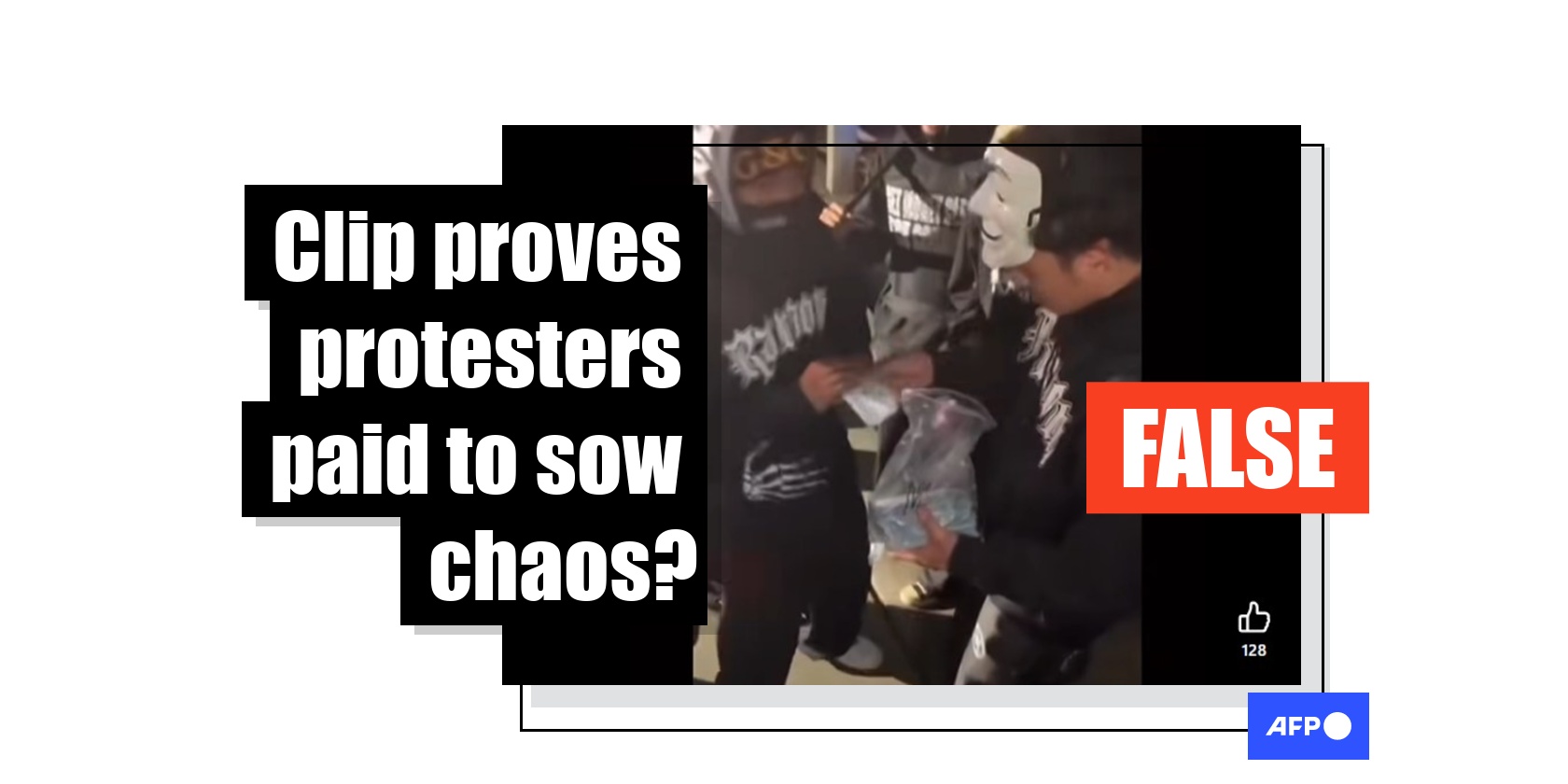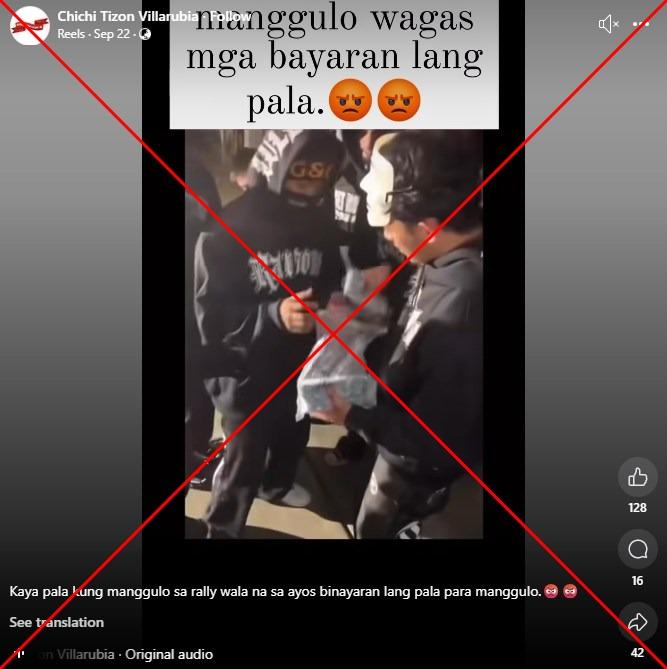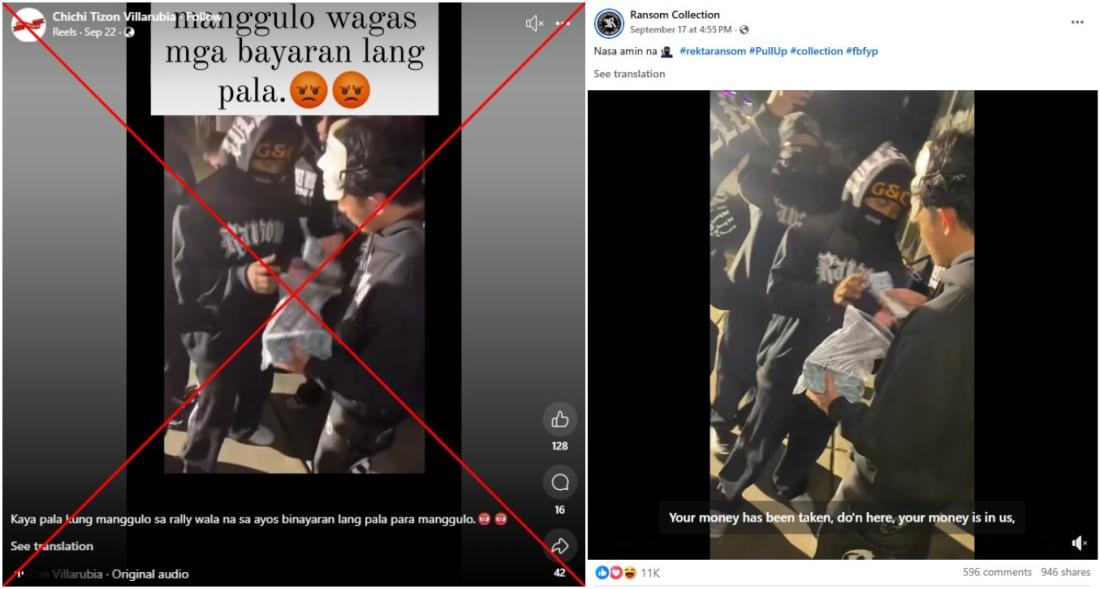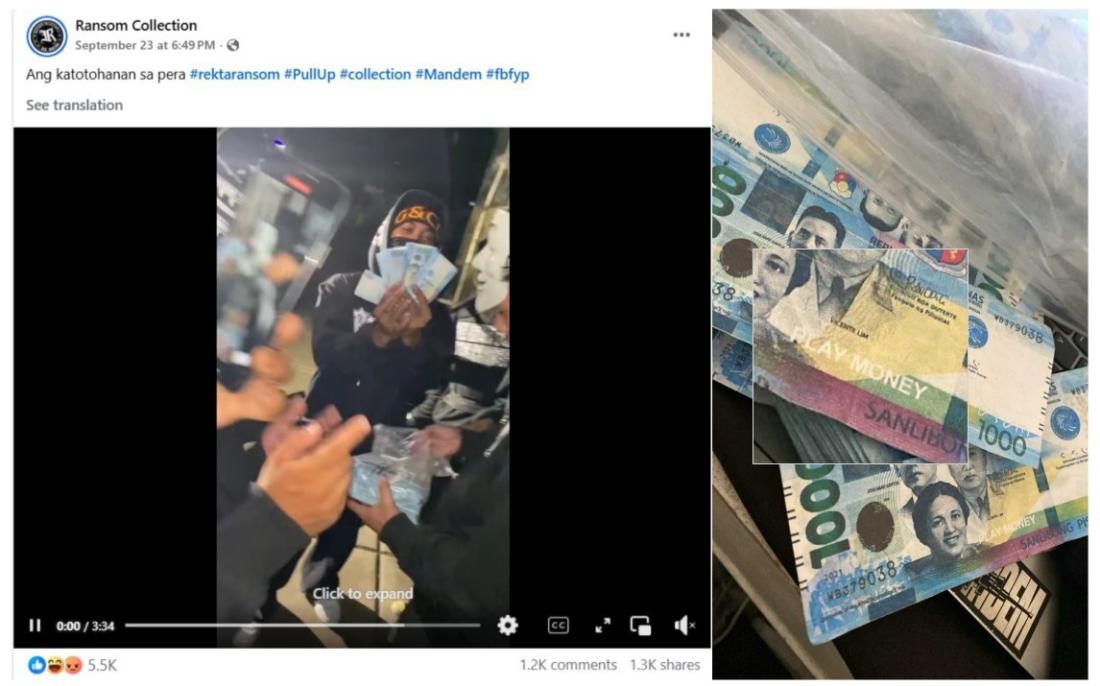
Streetwear advert baselessly linked to violent Philippine clashes
- Published on September 27, 2025 at 11:11
- 4 min read
- By Ara Eugenio, AFP Philippines
"So that's why they were so out of control at the rally, turns out they were just paid to cause a scene," reads a Tagalog-language Facebook post published September 22.
It also shares a video showing men in black jackets apparently holding wads of 1,000-peso bills. One of them says: "This is Discaya's money ... shoutout to all the corrupt, Ransom now has your money."
The comment refers to Pacifico and Sarah Discaya, owners of a Philippine construction firm who admitted to bribing lawmakers to secure government contracts for so-called ghost flood control projects -- construction jobs that had been paid for but never completed (archived link).
Public scrutiny has been intensifying since President Ferdinand Marcos put them centre stage in a July State of the Nation address that followed weeks of deadly flooding.

The video racked up over three million views in similar posts on X and TikTok after police in the Philippine capital Manila arrested more than 200 people, including at least 88 minors, in clashes at the end of a largely peaceful demonstration on September 21 (archived link).
Officers deployed water cannons and deafening sirens against crowds of mostly young, rock-throwing protesters.
An AFP journalist at the scene witnessed police throwing rocks back towards protesters, something a spokeswoman for the force denied.
Police later said that their initial probe pointed to a group of "hip-hop gangsters" allegedly influenced by a certain rapper as possibly behind the violence.
Interior secretary Jonvic Remulla claimed that the minors were each paid 3,000 pesos (US$52), and that videos online showed them flaunting the money, though he did not present specific evidence (archived link).
Remulla did not respond to AFP's query on whether the circulating clip was the video he was referring to.
Clothing brand advert
A reverse image search on Google using keyframes from the falsely shared clip led to the same footage posted on the Facebook page of the "Ransom Collection", a Philippine-based clothing brand, on September 17 (archived link).
The caption reads: "We have it with us #rektaransom #PullUp #collection."

JA Mandem, the creator of the brand, denied any connection to the September 21 rallies, saying the video was actually filmed in the town of Cainta in Rizal province, east of Manila, on September 13 -- before the protests in the capital (archived link).
He said the people in the video were his friends and that the 1,000-peso bills were fake money they often used as props (archived link).
"It's purely for business, that's all. We just timed our promotions to the issue, but we weren't targeting anyone in particular," Mandem, 19, told AFP over a phone call on September 24.
"We're just here trying to sell clothes. We have no malicious intent."
Mandem explained that their brand, Ransom Collection, drew inspiration from street "gangster" culture and that prop money was a recurring feature in their promo shoots but "never used for anything outside of that".
AFP reviewed posts on the Ransom Collection Facebook page that shared videos from the same shoot, where the group can be seen playing with the same bundles of fake bills (archived link).
In a video call with AFP, Mandem also showed the bills up close, where the words "play money" were clearly printed.

Mandem also shared recordings with AFP of his conversations on September 21 that placed him that day in the town of Taytay, also in Rizal province, as well as CCTV footage showing him later at night at the Ransom Pull Up store, around 18 kilometres (11 miles) from the site of the clashes on Mendiola Street in Manila (archived link).
'I'm worried'
AFP separately spoke with hip-hop artist France Ucep Reyes, commonly known as "YB Towel", who appeared prominently in the advert.
The 19-year-old likewise denied any links to the rallies, stressing the shoot was purely for promotional purposes and that he was bluffing when he mentioned the contractors in the video.
"At the time, the issue regarding the Discayas was trending, and among friends we were just messing with each other," Reyes said. "But I had no bad intentions when I said it."
Reyes said that he could not have been at the rallies in Manila because he had gone home to his family in Tayabas City, Quezon province -- about 130 kilometres (80 miles) away -- on September 16, and did not return to the Philippine capital until September 22.
AFP also spoke with his parents, who provided CCTV evidence that they had seen him at home those days, including the afternoon and evening of September 21.
Reyes, who sells towels on the street for a living, said he has since stopped due to safety concerns after experiencing harassment from both online users and bystanders who accused him of being a paid protester.
"The video they're spreading makes me angry, because they don't have enough evidence to back it up... I wasn't even there. Now I'm worried that one day, while I'm just selling towels, I'd get arrested."
AFP has fact-checked other misinformation about the anti-corruption protests in the Philippines here.
Copyright © AFP 2017-2026. Any commercial use of this content requires a subscription. Click here to find out more.
Is there content that you would like AFP to fact-check? Get in touch.
Contact us
